
Advertisement
Salmon might be an excellent choice of fish from a health standpoint, but what about its impact on the environment? Some experts say that if you’re eating the farmed variety, you might want to reconsider.
A new 80-page report from Compassion in World Farming and the Changing Markets Foundation has warned that fishing to feed salmon farms is going to empty our seas.
At the heart of the concern is FMFO, or fishmeal and fish oil. Each year, millions of tons of mackerel, krill, sardines, herring, anchovies and other species are caught and then ground up to create FMFO, which is then fed to the salmon that are caged in farms dotting the West Coast.
The groups warn that this increasing reliance on FMFO is not only putting marine wildlife in danger but also threatening human food security overall. They report that one fifth of the total wild fish caught around the world are processed into FMFO and fed to farmed fish. In 2017, the fishmeal market was worth more than $5 billion globally.
The problem is only likely to get worse as the fish farm industry continues to grow. According to predictions from the United Nations Food and Agriculture Organization, the global production of farmed fish will climb to 109 million tons in the next decade and will account for 60 percent of the planet’s fish consumption.
Not surprisingly, the FMFO industry has claimed the report is biased. They say that fish farming can deliver healthy protein to the masses, but the report says that it could ultimately have the opposite effect by making less fish available for people to consume directly. They added that their reluctance to slow down is “pushing marine resources beyond planetary boundaries” and failing to consider the welfare of the animals involved.
In Scotland, which is one of the world’s biggest producers of farmed salmon, there are calls to phase out the use of fish caught in the wild for creating feed. They’re asking aquafeed producers to find more sustainable alternatives that won’t cause ecological problems.
The head of the Scottish Salmon Producers Organization, Julie Hesketh-Laird, acknowledged the need for responsibly sourced ingredients in the industry and expressed a desire to find more sustainable alternatives, like seafood trimmings.
The report also draws attention to the West African coast, where many Chinese-owned fishmeal factories have been established from Senegal to Mauritania. More than half of that area’s fish are being overexploited, according to the authors.
They explain how hundreds of billions of smaller fish experience traumatic deaths on large industrial fishing vessels to fuel underwater factory farms.
Wild salmon is healthier
Even if you somehow have no ethical objections to farmed salmon, there’s another reason you might want to stick to the wild variety: It’s more nutritious. Although farmed salmon does have some beneficial omega-3 fatty acids, their benefits are limited by the fact that the fish also tends to have higher levels of omega 6 fatty acids, which are pro-inflammatory.
Wild-caught salmon from non-polluted waters also tends to have more astaxanthin, a phytonutrient rich in antioxidants. That’s because they feed naturally on red algae, unlike farmed salmon. There’s also the fact that farm-raised salmon are often fed genetically modified grains like soy in addition to the fish meal.
In short, if you’re looking for the health benefits of salmon, you’re not going to get very much bang for your buck if you opt for the farmed varieties. While wild salmon might carry a higher price tag, it’s an investment into your health that could pay off for years to come.
Sources for this article include:
Advertisements







